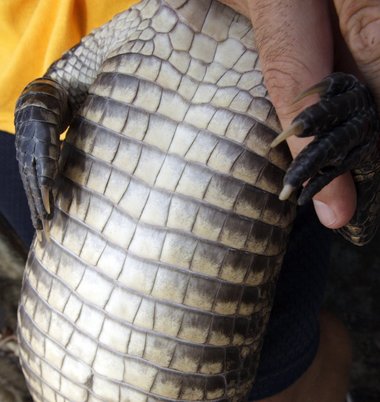According to NOLA.com, the Louisiana alligator industry is staging a comeback thanks to surging demand for alligator skin.
"After a tough few years during the recession, consumer interest in luxury goods that involve alligator skins is picking up."If you can't sell the alligator skins, there's no reason to collect eggs," Wall said.
But these days, with the economy beginning to show signs of improvement, the alligator skin market is experiencing an uptick.
Sales of alligator skins fell from $55 million in 2007 to $42 million in 2008. But the 2010 harvest and the expected harvest from 2011 are proof that the alligator industry is recovering.
The outlook at the moment for the industry is very positive, said Noel Kinler, a program manager for the Department of Wildlife and Fisheries.
"A lot will hinge on what happens in Europe," Kinler said. "If current demand remains consistent or increases, you can expect a rise in prices."
The state's gator farmers and hunters account for around 80 percent of the total production of American alligators, most of which are used for their skin, which is sent off to Europe and Asia where it is made into high-end fashion items.
Mark Shirley, an area regent for the Southwest, specializing in aquaculture and coastal resources and part of Louisiana State University's AgCenter, said the alligator industry relies heavily on the global economy because most of the skins are manufactured into products in France, Italy and Asia.
"Alligator products are a high-fashion, exotic leather," Shirley said. "It is an upscale item. Luxury goods don't sell well when people are strapped for money."
The market for alligator goods has stabilized a bit because some of the luxury goods are starting to sell again, he said. The industry always goes through ups and downs since it relies so heavily on the fashion sector and fashion trends change year to year, Shirley said.
Most money made from alligators is from the sale of their skin, with alligator meat accounting for only a fraction of the market. Last year the value of the meat harvested from gators in the state was a little over $2 million while skin value came out to over $28 million, according to data from the Louisiana Department of Wildlife and Fisheries.
Farm-raised gators tend to have better skins because of the way they are raised, Shirley said. Farm-raised gators also tend to be smaller in size, producing smaller skins that are especially in demand by watch companies, he said.
"There will always be a demand for the alligator," he said. "Projections are especially good for China. Their market is getting more consumer-oriented, more people have money. Alligator skin is very popular in China."
Wall wasn't the only Louisiana alligator farmer who scaled back on the number of eggs collected during the recession, according to Kinler.
"We were faced with a significant drop-off in demand and price," Kinler said. "The industry has gone through a belt-tightening approach, reducing stocking rates in order to match up with the anticipated demands."
But after a couple of years in which farmers collected fewer eggs, they're back at it again. Farmers collected 353,176 eggs last year, up from 29,822 in 2009.
"Demand for alligators is strong enough to encourage farmers to go out and collect eggs," Kinler said. "Since the bottoming out of price and demand, we have seen a consistent recovery in skins."
Alligator farms must adhere to rules levied by the state, which sets collection numbers and demands that 12 percent of gators hatched be returned to the wild to help sustain the population. Farmers and ranchers get permits to collect eggs on private marshland, picking up eggs when the season starts in June and taking them back to their farms to await hatching. Hatchlings stay on the farm until they reach the proper age to euthanize and skin.
"It's a supply and demand game," said Wall, who added 80,000 hatchlings to his farm last year and has been entertaining visitors from abroad of late.
In May he met with a tanner from France and nine watchmakers. He expects the demand to stay strong for the next two years, but said a lot depends on what happens in Europe with the euro. Many of the skins from his gators go to make watch straps and hand goods in Europe. He spends 12 hours a day on his farm seven days a week, working most days out of the year to ensure everything is going as planned.
"It's very important for the communities and the state as a whole that we do everything in our power to promote the alligator industry," Wall said. "There's a lot of families that rely upon the capital generated in the alligator industry."



